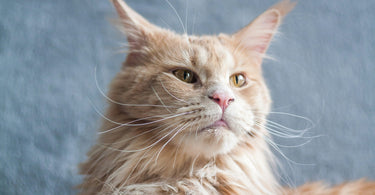by Francesca Lees, Tippaws' in-house Registered Veterinary Nurse, Feline Behaviourist
Maine Coon cats, celebrated for their majestic size and striking appearance, are among the largest domestic cat breeds. Known for their long, thick coats with dense undercoats, these gentle giants require daily grooming to maintain their luxurious fur.
Main Coons come in a variety of colours, including tabby, ginger, grey, black, and tortoiseshell, with some rarer hues like the black smoke variety. Their large eyes, typically green or yellow/gold, add to their captivating look.
Originating from Maine, USA, these cats have been part of American folklore since the early 19th century and are often mistaken for the Norwegian Forest Cat due to their similar appearance. Recognised for their friendly, sociable nature and impressive intelligence, Maine Coons are a popular choice among cat enthusiasts, offering both companionship and charm to any household.
In this article we take a deeper look at these lovely cats!
Appearance of the beautiful Maine Coon and grooming
- Size: large to extra large. These are one of the largest cat breeds.
- Coat: long and thick with a dense undercoat which requires daily grooming
- Colours: they come in a range of colours such as tabby, ginger, grey, black, tortoiseshell and some rarer colours such as the black smoke variety
- Eyes: large and typically on a slight slant. usually green or yellow/gold
Maine coon cats are known for their striking appearance and unique characteristics. Originating from the state of Maine, these forest cats are often mistaken for the norwegian forest cat due to their similar appearance.
These feline beauties have longest and silky coats, often resembling a raccoon. Their paws are also unique, with some maine coons being polydactyl. The maine coon cat breed standard includes a brown tabby coat and large eyes that come in a variety of colours such as green or yellow/gold. Despite their size, maine coons don't mind being outdoor cats and are known for being friendly and sociable. In fact, they were named the official state cat of Maine in 1985, becoming a maine state champion coon cat.
Where does the Maine Coon breed originate from?
Maine coons originated in the USA in Maine. They are believed to be one of the oldest natural breeds in North America. Their exact origins are unknown, but they have been part of American folklore since the early 19th century.
Fun fact: The Maine coon polydactyl holds the record for being the longest cat in the world, according to the Guinness World Records. This purebred maine coon named Stewie measured an impressive 48.5 inches from nose to tail.
Maine coon cat breed personality
Temperament: Friendly, sociable, and affectionate. Known for their “dog-like” behaviour.
- Intelligence: Highly intelligent and trainable.
- Activity level: Playful and energetic, enjoy interactive play and puzzles.
- Vocalisation: Known for their unique chirps and trills rather than typical meowing.
Maine coons are one of the most popular domestic cat breeds, known for their friendly, sociable, and affectionate maine coon cat's personality traits. These adorable maine coon cats are often described as having "dog-like" behaviour, showing great loyalty and forming strong bonds with their owners.
Not only are they affectionate, but they are also highly intelligent and trainable. In fact, the maine coon is one of the smartest domesticated cat breed and can learn tricks and commands easily. Despite their large size, maine coons also have a playful and energetic nature, enjoying interactive play and puzzles. These cuddly cats are also known for their unique vocalisations, often using chirps and trills instead of typical meowing.
Care and Maintenance:
- Grooming: Regular brushing needed due to their long fur to prevent matting and reduce shedding.
- Diet: Balanced diet consisting of a complete dry food (such as Tippaws) with appropriate nutrients; portion control is essential to prevent obesity.
- Exercise: Require ample playtime and physical activity to stay healthy and engaged.
Health and lifespan:
- Lifespan: 12-15 years on average.
- Health Issues: Prone to certain genetic conditions such as hypertrophic cardiomyopathy (HCM), hip dysplasia, and spinal muscular atrophy (SMA).
Habitat
Maine Coon cats are adaptable and can thrive in various environments:
Indoor living
Maine Coons are well-suited to indoor living. They are large, active cats that benefit from ample space to roam and play. Indoor environments should include sturdy cat trees, scratching posts, and interactive toys to keep them engaged.
Temperature
Maine Coons have thick, water-resistant fur, making them well-suited to cooler climates. They can tolerate colder temperatures better than many other breeds. However, they also adapt well to indoor heating and can live comfortably in warmer indoor climates, provided they have access to cool areas during hot weather.
Space requirements
Due to their size, Maine Coons need more space than average cats. Homes with plenty of room to explore, climb, and play are ideal. They enjoy high perches and lookout points, so multi-level cat furniture or shelves can be beneficial.
Outdoor access
If given outdoor access, it should be safe and secure, such as an enclosed garden (with cat proof fencing) or a "catio" (cat patio) to prevent them from roaming too far and encountering dangers. Regular outdoor time can provide additional mental and physical stimulation.
Social environment
Maine Coons are sociable and enjoy being around people and other pets. They thrive in households where they receive plenty of attention and interaction. They are good with children and can get along well with other cats and even dogs.
Interactive environment
Providing puzzle toys, interactive feeders, and engaging playtime is crucial for their mental stimulation and to prevent boredom. Maine Coons are known for their playful and curious nature, so environments that cater to their need for exploration and play are ideal.
Popularity
Recognised by all major cat registries, they are consistently one of the most popular cat breeds in the United States and are the fourth most popular cat breed in the UK.
Suitability as pets and Maine Coon kittens
Maine Coons are beloved for their majestic appearance, gentle temperament, and playful nature, making them wonderful companions for families and individuals alike. They are nicknamed the “gentle giants” and make great pets. They would be suited to a first time cat owner who is willing to do daily brushing and has a knowledge of the breed and how much maintenance and grooming they require.
Kittens can be taught from a young age to tolerate and enjoy grooming but this must be started when young and done in a slow and gradual manner with lots of treats and positive reinforcement. This is essential for ensuring that Maine Coons are groomed daily and do not build up knots in their fur. Knots and mats which build up can become very difficult to remove and often need to be clipped out by a groomer or vet.
If you'd like advice about your cat's behaviour or health, you can contact Francesca Lees via her website.


I have a beautiful male ginger Maine Coon named Oliver. We live in a retired community of about 200. Oliver loves to walk down the halls right next to me riding my scooter. He is well behaved, friendly to most everyone, vocal, always wanting to be petted. We have visited in 15 apts to see friends. He explores and then lies down to rest. He is a comfort to me by myself. He sleeps by me and often goes and brings me a toy back. He is the best cat I’ve ever had and my life has been richly blessed by years of cats.
Hi Suzanne
Many cats bite their owners, not just Maine coons.
Often cats bite humans when they are not able to hunt or express natural hunting behaviour. If your cat is an indoor cat it’s likely he’s not fulfilling his need to stalk, hunt and catch prey. You can help them stop this by playing predatory type games with him – such as using a fishing rod type toy and pulling it along, enabling him to “hunt” it. Play with him for at least 5 minutes a day. Also never play games using your hands and fingers (like wiggling your fingers under a blanket or duvet) as this only encourages them to pounce on us.
Hope that helps!
Francesca
Hi Ian
A full size Maine coon can be very large and so I would suggest you get a larger cat flap. Sure flap do a “pet door” which is suitable for cats and small dogs. I believe this would be perfect for large Maine coons.
Maine coons can go outside and it’s your choice if you choose to keep them indoors or let them outside however bear in mind that if they want to go outdoors and they can’t get outside it could cause behaviour issues. There is no reason why a Maine coon can’t go outside like other breeds, it’s your choice.
Hope that helps
Francesca
Hi Gwen
I think it sounds like your cat may have had a bad experience, maybe as a kitten, or they have been born with an anxious and fearful disposition. I would suggest you speak to a feline behaviourist in your area or speak to your local veterinarian who can refer you to a local feline behaviourist near to you. Good luck!
My name is Gwen B. I have a black Maine Coon cat named Bentley. He runs from me, is not friendly, he hides from me all the time . He makes weird noises often and just doesn’t “ act like a cat”. I’ve had two (2) other tabby cats prior ( male and female) that were very different from him . They r both deceased now and I miss them both so much. Bentley is not what I expected and I am sooooo upset and sad that I/ we have not bonded yet after 6 months. Ugh!!! What can I do? I cannot even get close enough to Bentley to take him to the Vet. He has not yet had his shots . I am very concerned and worried and concerned. What can I do? Any suggestions anyone?? Hopefully, someone reading this can help. Thx for ur support and patience. Gwen Barnes , (508) 454-1996 is my cell number for valid, confidential and helpful advice from all cat lovers. Thx for reading this. Thx for sharing!!!